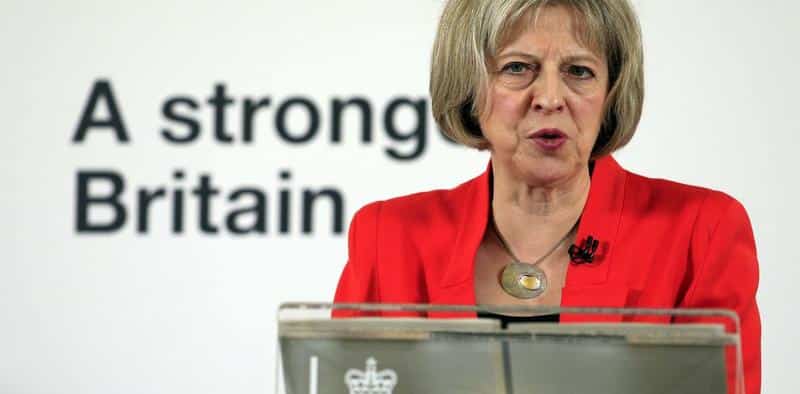BRITAIN, POST- BREXIT: WHAT NEXT?
By Mike Faulkner
Sr. Contributing Editor, London Correspondent

May: Probably a Thatcher redux in intent, albeit much more carefully disguised. She leads a government packed with some of the most reactionary Tory politicians ever to have held high office.
Tempting as it may be to pick up on some of these events, this Letter from London will be restricted to what was promised in the last one in early July: further observations about the EU referendum. So far there has not been very much by way of response from the rest of the EU. It still appears as though neither the British government nor their former partners have worked out how to deal with an outcome no-one expected. What follows will not be the last word on the subject, but rather some pro tem comments on the impact of the referendum result on the political parties at Westminster and beyond
The Tories: Cameron’s resignation; May’s accession.
[dropcap]T[/dropcap]he Conservative party – or the Tory party – as it is still widely known despite having abandoned that designation nearly 200 years ago, is a ruthless political machine. It was, from the late eighteenth century the pre-eminent political organization of the ruling class, first of the landed aristocracy, and later from the second half of the nineteenth century, of the new industrial capitalist class. Its conservatism has always come second to its pragmatic opportunism. Thus, for example, Disraeli was quite prepared to steal the clothes of the Liberals in the 1870s by extending the franchise to sections of the rising middle class, as were Churchill and MacMillan in the 1950s by accepting the welfare state and the mixed economy put in place by Labour between 1945 and 1951. But the triumph of unfettered neo-liberal capitalism introduced by the Thatcher governments after 1979 brought in a privatizing bonanza under the rubric ‘there is no alternative’ (Tina). Rather as the pragmatic Tories of the post war years had accepted the welfare state as a compromise necessary for preserving the economic and political power of the ruling class during decades of near full employment and relative economic stability, so Blair and New Labour bought in to neo-liberalism during the decade prior to the crash of 2008, with the argument that deregulation of the financial sector enabled them to use enhanced tax revenues to fund the welfare state.
[dropcap]N[/dropcap]ow, following six years of relentless austerity with its inevitable corollary of increasing inequality, proliferation of food banks for the poor, an insoluble housing crisis, rising public anger and social breakdown, the crisis reached its head in the outcome of the EU referendum. The Brexit vote, for all the incoherence, xenophobia, little Englander nationalism and outright racism associated with it, was also motivated by anger and resentment directed at distant elites in Brussels and Westminster. Part of the Brexit vote was delivered by middle class UKIP and Tory supporters, but the defection from Labour of millions of atomized working class voters in the de-industrialized heartlands of what once were vibrant communities, was decisive in the outcome. That anger and those sentiments are not going to go away.
The Tories have handled their leadership crisis with extraordinary alacrity. What was assumed would be a months’ long process to appoint a new leader to replace Cameron as PM, was accomplished in less than a week. The requirement that the various contenders would be whittled down to two by the votes of the parliamentary party, to be followed by a further vote of the full national membership from which the winner would emerge, was rendered unnecessary when one of the two remaining candidates withdrew. This left Theresa May as the new leader; all very neat and speedy. But it is almost certain that this seemingly smooth transition which has appointed to office Britain’s second woman as prime minister, will turn out to be no more than the calm before the many storms that are most certainly gathering.
Predictably, the media pundits are already fulsome in their tributes to the ‘cool head’ and ‘safe pair of hands’ of the former home secretary who is praised for her Downing Street speech pledging to govern in the interests of the poor and underprivileged and to wage war on inequality and curb the excesses of the super-rich. She even used the expression ’working class’ (‘If you’re from an ordinary working class family, life is much harder than many people in Westminster realise.’), a term which for years has been virtually expunged from the vocabulary of both Tory and Labour Westminster politicians who long ago replaced it with such phrases as ‘hard working families’. But, as the saying goes, talk is cheap. Thirty seven years ago Margaret Thatcher, having just become PM, addressed her admirers outside Downing Street, with the emollient balm of Francis of Assisi’s words: ‘Where there is discord may we bring harmony….And where there is despair may we bring hope.’ The huge scars from the destruction wreaked in the years that followed, mark the landscape of post-industrial Britain and remain unhealed to the present day.
[dropcap]T[/dropcap]he appointment of more women to cabinet posts will not alter the fact that May leads a government packed with some of the most reactionary Tory politicians ever to have held high office. Rather than waste time dealing with the meagre talents of an unimpressive bunch of career politicians, it is enough to mention the views expressed by one or two of them. Andrea Leadsom, who withdrew from the contest to become PM after being criticised for saying that Theresa May was less suited to the leadership than she was because she (Leadsom) had children and May didn’t, has been appointed secretary of state for the environment. She supports fox-hunting and in 2015 questioned whether climate change was actually happening.

Johnson: The man may be an oafish buffoon but we will not quibble over his dislike for Hillary and Obama.—Editors
Then there is Boris Johnson, who, perhaps alone among the new cabinet is known outside the Westminster bubble. He has, as is now well known, been appointed foreign secretary. Although he is rather popular among the large number of people in Britain who enjoy jokers and clowns, there is a very unpleasant tang to most of his supposedly humorous quips. He is on record as describing Africans as ’flag-waving piccaninnies with watermelon smiles.’ He claimed that the people of Liverpool, who fought for years to expose the police cover-up of the Hillsborough football disaster, see themselves as victims who resent their victimhood while wallowing in it. During the Brexit campaign which he led, he described Barak Obama as having ‘part Kenyan ancestry with an ancestral dislike of the UK.’ He accused Hillary Clinton of ‘looking like a sadistic nurse in a mental hospital.’ He will represent Britain to the world.
May, the Tories and Scotland
[dropcap]T[/dropcap]heresa May, in her inaugural address, spoke of the ‘precious bond’ that bound the different components of the UK together. She was thinking primarily of Scotland and the question hanging over its continued membership of the Union. She pointedly resurrected the earlier name of the Tory party – the Conservative and Unionist Party – which used always to refer to the union with Northern Ireland. She sped up to Edinburgh to confer with Nicola Sturgeon, the shrewd and immensely popular leader of the Scottish National Party. It was a short meeting and the required civilities were observed. But cutting through all the pretences of diplomacy, there are two contradictory positions that cannot be reconciled: (i) In the EU referendum the Scottish people voted overwhelmingly to remain in the EU and the SNP is firmly committed to ensuring that Scotland does remain. (ii) The English and Welsh people voted by a much smaller majority to leave the EU. As Theresa May has said quite firmly that ‘Brexit means Brexit’(whatever that may mean) there is clearly a major political and constitutional problem looming here. It won’t go away. Sturgeon has cannily conceded that she is more than willing to explore every possible means of ensuring that Scotland remains in the EU in line with the wishes of its people. She is obviously keeping her powder very dry.
It is highly unlikely – to the point of being virtually impossible – from the standpoint of both the EU and the Westminster government, to find a way of squaring the circle. At some point during the negotiations prior to invoking article 50 of the Lisbon Treaty, which will trigger Britain’s withdrawal, it will become clear that Scotland will not be allowed to remain in the EU as long as it remains in the UK. Ironically, during the 2014 independence referendum the Unionist parties (i.e. all except the SNP) argued strongly that Scotland’s continued membership of the EU was entirely dependent on remaining part of the UK. Now, the Brexiters and May’s government will be obliged to tell the Scottish people bluntly that they will be dragged out of the EU, like it or lump it. Sooner or later it must come to that. The only question is, how soon.
Next week we’ll look at the crisis in the Labour Party.
 is a British citizen living in London. For many years he taught history and political science at Barnet College, until his retirement in 2002. He has written a two-weekly column, Letter from the UK, for The Political Junkies Magazine since 2008. Over the years his articles have appeared in such publications as Marxism Today, Monthly Review and China Now. He is a regular visitor to the United States where he has friends and family in New York City. Contact Mike at mikefaulkner@greanvillepost.com
is a British citizen living in London. For many years he taught history and political science at Barnet College, until his retirement in 2002. He has written a two-weekly column, Letter from the UK, for The Political Junkies Magazine since 2008. Over the years his articles have appeared in such publications as Marxism Today, Monthly Review and China Now. He is a regular visitor to the United States where he has friends and family in New York City. Contact Mike at mikefaulkner@greanvillepost.com
ALL CAPTIONS, IMAGES, PULLQUOTES AND IN-LINE COMMENTARY BY THE EDITORS, NOT THE AUTHORS.
=SUBSCRIBE TODAY! NOTHING TO LOSE, EVERYTHING TO GAIN.=
free • safe • invaluable
[email-subscribers namefield=”YES” desc=”” group=”Public”]
